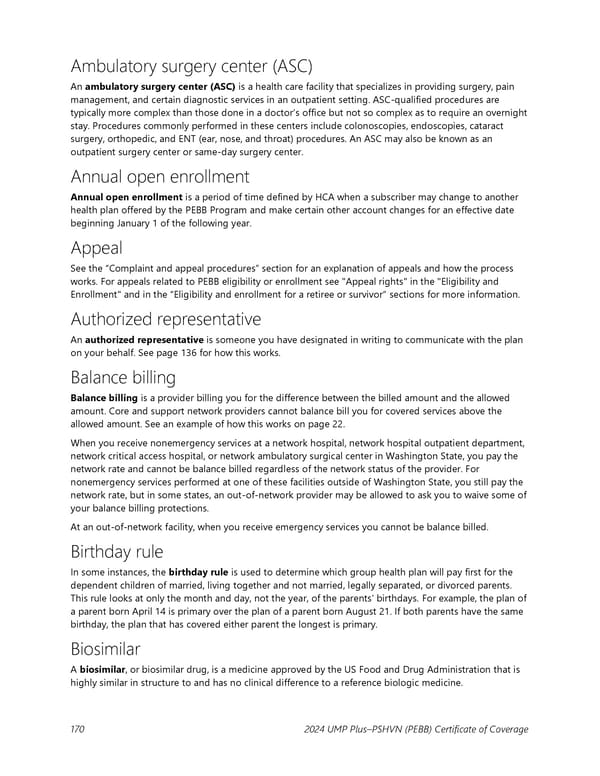Ambulatory surgery center (ASC) An ambulatory surgery center (ASC) is a health care facility that specializes in providing surgery, pain management, and certain diagnostic services in an outpatient setting. ASC-qualified procedures are typically more complex than those done in a doctor’s office but not so complex as to require an overnight stay. Procedures commonly performed in these centers include colonoscopies, endoscopies, cataract surgery, orthopedic, and ENT (ear, nose, and throat) procedures. An ASC may also be known as an outpatient surgery center or same-day surgery center. Annual open enrollment Annual open enrollment is a period of time defined by HCA when a subscriber may change to another health plan offered by the PEBB Program and make certain other account changes for an effective date beginning January 1 of the following year. Appeal See the “Complaint and appeal procedures” section for an explanation of appeals and how the process works. For appeals related to PEBB eligibility or enrollment see "Appeal rights" in the "Eligibility and Enrollment" and in the “Eligibility and enrollment for a retiree or survivor” sections for more information. Authorized representative An authorized representative is someone you have designated in writing to communicate with the plan on your behalf. See page 136 for how this works. Balance billing Balance billing is a provider billing you for the difference between the billed amount and the allowed amount. Core and support network providers cannot balance bill you for covered services above the allowed amount. See an example of how this works on page 22. When you receive nonemergency services at a network hospital, network hospital outpatient department, network critical access hospital, or network ambulatory surgical center in Washington State, you pay the network rate and cannot be balance billed regardless of the network status of the provider. For nonemergency services performed at one of these facilities outside of Washington State, you still pay the network rate, but in some states, an out-of-network provider may be allowed to ask you to waive some of your balance billing protections. At an out-of-network facility, when you receive emergency services you cannot be balance billed. Birthday rule In some instances, the birthday rule is used to determine which group health plan will pay first for the dependent children of married, living together and not married, legally separated, or divorced parents. This rule looks at only the month and day, not the year, of the parents’ birthdays. For example, the plan of a parent born April 14 is primary over the plan of a parent born August 21. If both parents have the same birthday, the plan that has covered either parent the longest is primary. Biosimilar A biosimilar, or biosimilar drug, is a medicine approved by the US Food and Drug Administration that is highly similar in structure to and has no clinical difference to a reference biologic medicine. 170 2024 UMP Plus–PSHVN (PEBB) Certificate of Coverage
 UMP Plus–Puget Sound High Value Network (PSHVN) COC (2024) Page 170 Page 172
UMP Plus–Puget Sound High Value Network (PSHVN) COC (2024) Page 170 Page 172